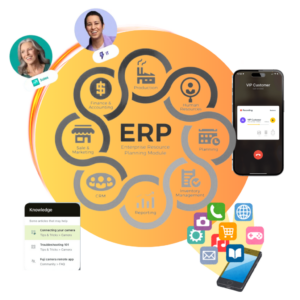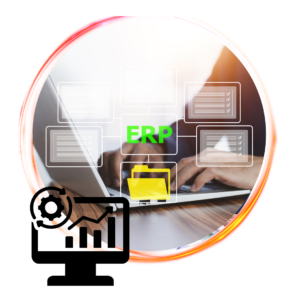In today’s rapidly evolving business landscape, companies are increasingly turning to advanced technology to streamline operations, improve efficiency, and enhance productivity. One such technology that is revolutionizing the way businesses manage their processes is Enterprise Resource Planning (ERP) systems. In this blog, we will explore the benefits, features, and implementation of ERP systems and ERP software in Abu Dhabi, focusing on how businesses in the region can leverage these solutions to drive growth.
What is an ERP System?
An ERP system is an integrated suite of software applications designed to help organizations manage and automate key business processes. These processes include accounting, procurement, inventory management, human resources, supply chain management, and customer relationship management. By centralizing these functions, an ERP system allows businesses to operate more efficiently, reduce operational costs, and make data-driven decisions.

The core purpose of an ERP system is to integrate various departments within an organization, ensuring that information flows seamlessly across functions. In doing so, it enables businesses to have real-time visibility into their operations, which is crucial for informed decision-making.
ERP Software in Abu Dhabi: Why is it Important for Businesses?
The business environment in Abu Dhabi is highly dynamic, with a growing number of companies across various industries such as construction, manufacturing, retail, and hospitality. As organizations in the region expand, managing complex operations becomes increasingly challenging. This is where ERP software comes into play.
ERP software in Abu Dhabi is essential for businesses that want to stay competitive and efficient in a fast-paced market. With ERP systems, companies can automate manual processes, eliminate redundant tasks, and ensure accurate data reporting. This leads to significant improvements in operational efficiency and customer satisfaction, while also enabling businesses to scale operations effectively.
Let’s take a closer look at the specific advantages of implementing an ERP system in Abu Dhabi.
Benefits of Implementing an ERP System in Abu Dhabi
- Improved Efficiency: One of the key benefits of an ERP system is its ability to automate routine tasks. Whether it’s managing payroll, tracking inventory, or processing orders, ERP software eliminates manual data entry, reducing the chances of errors and saving valuable time.
- Real-time Data Access: An ERP system offers real-time visibility into business operations. Decision-makers can access up-to-date information about finances, inventory, sales, and other critical metrics, enabling them to make informed decisions quickly.
- Cost Savings: ERP systems help businesses reduce operational costs by streamlining processes, minimizing manual errors, and improving resource allocation. With accurate data, businesses can also make better budgeting decisions and optimize their spending.
- Enhanced Collaboration: By integrating various departments into a unified system, an ERP solution fosters better communication and collaboration among teams. This improves coordination and ensures that everyone is on the same page regarding business operations.
- Scalability: As businesses grow, so do their operational needs. ERP systems in Abu Dhabi are designed to scale with your business, offering flexibility to add more users, integrate new modules, or expand into new markets.
- Compliance and Reporting: In industries such as manufacturing, retail, and healthcare, compliance with local regulations and standards is essential. ERP software helps businesses ensure compliance by maintaining accurate records and generating reports that meet regulatory requirements.
- Better Customer Service: An ERP system allows businesses to provide better customer service by enabling real-time access to order status, inventory levels, and customer history. This improves response times and customer satisfaction.
Key Features of ERP Systems
When selecting ERP software for your business in Abu Dhabi, it’s essential to understand the key features that make ERP systems so powerful. These features help organizations optimize their processes and ensure they are making the most of their ERP investment.

- Accounting and Financial Management: ERP systems typically include modules for managing finances, such as general ledger, accounts payable, accounts receivable, and financial reporting. These modules help businesses automate financial tasks, track expenses, and ensure compliance with accounting standards.
- Inventory Management: With an integrated ERP system, businesses can manage their inventory efficiently, tracking stock levels, orders, and shipments. This helps reduce stockouts and overstocking, ensuring that products are available when customers need them.
- Human Resource Management: ERP systems offer features to streamline HR processes, such as payroll management, employee records, performance tracking, and recruitment. This helps businesses manage their workforce more effectively and reduce administrative burden.
- Supply Chain Management: An ERP system helps businesses optimize their supply chain by providing visibility into procurement, production, and distribution processes. This enables organizations to make data-driven decisions about suppliers, pricing, and inventory management.
- Customer Relationship Management (CRM): Many ERP systems include CRM functionality, allowing businesses to track customer interactions, manage leads, and deliver personalized customer experiences. This improves customer retention and drives sales growth.
- Sales and Order Management: ERP software helps businesses manage their sales processes from order creation to invoicing. By automating sales workflows, companies can improve order accuracy, reduce processing time, and ensure timely delivery.
- Analytics and Reporting: ERP systems often come with powerful reporting and analytics tools that allow businesses to generate customized reports on financial performance, inventory levels, sales trends, and more. This helps organizations make data-driven decisions and identify areas for improvement.
Selecting the Right ERP Software for Your Business in Abu Dhabi
Choosing the right ERP software for your business is a critical decision that will impact your operations for years to come. When evaluating ERP systems, consider the following factors:
- Industry-Specific Features: Different industries have different requirements when it comes to ERP software. For example, manufacturing businesses may need features for production planning, while retail businesses may require tools for managing point-of-sale transactions. Make sure the ERP system you choose offers the functionality your business needs.
- Customization: ERP systems are not one-size-fits-all solutions. Ensure that the software can be tailored to your business processes and workflows. A customizable ERP system will provide the flexibility to adapt as your business grows and evolves.
- User-Friendly Interface: The success of an ERP system depends on how well employees can use it. Look for an ERP software solution with an intuitive and easy-to-navigate interface, which will reduce training time and improve user adoption.
- Integration Capabilities: Your ERP system should be able to integrate with other software applications you are currently using, such as customer relationship management (CRM) software or payroll systems. Integration ensures that data flows seamlessly between different systems.
- Vendor Support: A reliable vendor that offers comprehensive support is essential when implementing an ERP system. Ensure the ERP provider offers training, technical support, and regular software updates to keep your system running smoothly.
How Agn IT Services Can Help with ERP Implementation in Abu Dhabi
Implementing an ERP system in Abu Dhabi can seem like a daunting task, but with the right guidance and expertise, it can be a smooth and successful process. At Agn IT Services, we specialize in providing ERP solutions tailored to the unique needs of businesses in Abu Dhabi and the wider UAE region.

Our team of experienced professionals works closely with clients to understand their business objectives and recommend the most suitable ERP software. We offer end-to-end ERP implementation services, from system selection to configuration, training, and support. Our goal is to help businesses in Abu Dhabi leverage the power of ERP technology to streamline operations, reduce costs, and drive growth.
The Future of ERP Systems in Abu Dhabi
As technology continues to advance, the future of ERP systems looks promising. Innovations such as artificial intelligence (AI), machine learning, and cloud computing are transforming ERP software and making it even more powerful and user-friendly.
For businesses in Abu Dhabi, embracing these new technologies will be essential to staying competitive in a fast-paced global market. Cloud-based ERP solutions, for example, offer the advantage of scalability, flexibility, and cost-effectiveness, making them an attractive option for growing businesses.
Moreover, AI-powered ERP systems can provide advanced analytics, predictive insights, and automation, helping businesses make smarter decisions and drive operational efficiency. The future of ERP in Abu Dhabi lies in leveraging these cutting-edge technologies to optimize processes and deliver greater value to customers.
ERP Systems in Abu Dhabi for Real Estate, HR, Construction, Manufacturing, and Trading Industries
In addition to the general benefits and features of ERP systems in Abu Dhabi, it is crucial to understand how these solutions are particularly tailored to meet the needs of specific industries in Abu Dhabi. Each sector has unique operational challenges and requirements, and ERP systems can be customized to address these needs. Whether you’re in real estate, HR, construction, manufacturing, or trading, the right ERP software can help streamline processes, improve decision-making, and boost profitability.
Let’s explore how ERP systems are transforming these industries in Abu Dhabi.
ERP Software for Real Estate in Abu Dhabi
The real estate sector in Abu Dhabi is one of the most dynamic industries, with rapid developments and a growing demand for residential, commercial, and industrial properties. Real estate companies in the region face numerous challenges, from managing large property portfolios to tracking sales, managing customer relationships, and ensuring compliance with local regulations. Implementing an ERP system can provide real estate businesses with the tools needed to overcome these challenges and operate more efficiently.
- Property Management: One of the primary uses of ERP software in the real estate sector is property management. ERP systems allow companies to track the status of properties, from available units to leased properties. This information is crucial for streamlining lease agreements, managing rent payments, and maintaining property records.
- Customer Relationship Management (CRM): Real estate businesses rely heavily on strong relationships with clients, whether they are buyers, sellers, or tenants. ERP systems with integrated CRM modules help real estate companies manage their customer base, track leads, and monitor customer interactions. This leads to better customer service, more effective marketing campaigns, and higher customer retention rates.
- Project Management: Real estate developers often have multiple ongoing projects, each with various stages of development. An ERP system helps streamline project management by providing real-time data on timelines, budgets, and resource allocation. This ensures that projects are completed on time, within budget, and to the required quality standards.
- Financial Management: Real estate companies need to manage significant financial transactions, from property purchases to rentals and sales. ERP software can assist with accounting, financial reporting, and auditing, ensuring transparency and compliance with local regulations in Abu Dhabi. Automated invoicing, payment tracking, and tax calculations also reduce the manual workload and minimize errors.
- Regulatory Compliance: In Abu Dhabi, the real estate sector must comply with various laws and regulations, including those related to property ownership, taxes, and leasing contracts. ERP systems can help businesses stay compliant by tracking regulatory changes, generating reports for audits, and ensuring accurate documentation.

By implementing an ERP system tailored to real estate operations, businesses in Abu Dhabi can improve property management, enhance customer relationships, and ensure regulatory compliance, ultimately improving profitability and operational efficiency.
ERP Software for Human Resources (HR) in Abu Dhabi
Human resources management plays a crucial role in any organization. Managing payroll, recruitment, employee performance, and compliance with labor laws can be a complex task, particularly as businesses grow. In Abu Dhabi, where diverse talent is employed across various industries, having a reliable ERP system for HR management can significantly enhance efficiency.
- Payroll Management: One of the most important aspects of HR management is payroll. ERP systems can automate payroll processing, ensuring that employees are paid on time and in compliance with local labor laws. By integrating payroll with other HR functions, such as attendance and leave management, ERP software ensures that salaries and benefits are calculated accurately, reducing manual errors.
- Employee Data Management: Storing and managing employee data manually can be time-consuming and error-prone. An ERP system centralizes employee records, including personal details, job roles, compensation, performance history, and training records. This centralized approach helps HR teams access and update information quickly, improving overall efficiency.
- Recruitment and Onboarding: Recruiting and onboarding new employees is a crucial part of HR management. An ERP system can help streamline the recruitment process by automating job postings, application tracking, and interview scheduling. Once new hires are on board, ERP software can also facilitate the onboarding process, including document management, training schedules, and benefits enrollment.
- Performance Management: ERP systems often include tools for managing employee performance. HR managers can set up performance review cycles, track goals, and monitor employee progress. This ensures that employees remain motivated and engaged, while also providing valuable insights into workforce performance.
- Compliance with Labor Laws: In Abu Dhabi, HR departments must adhere to strict labor laws, including those related to wages, working hours, and employee benefits. ERP systems help ensure that businesses comply with local regulations by automatically updating policies, generating reports, and keeping accurate records of employee-related activities.
- Training and Development: Employee development is critical to business growth, and ERP systems provide tools for managing training programs, certifications, and career development. By tracking employee skills and competencies, businesses can ensure that their workforce remains competitive and capable of handling evolving industry demands.

By leveraging ERP systems for HR management, businesses in Abu Dhabi can improve employee satisfaction, streamline HR operations, and ensure compliance with labor laws, all of which contribute to overall organizational success.
ERP Software for the Construction Industry in Abu Dhabi
The construction industry in Abu Dhabi is a key driver of economic growth, with large-scale infrastructure projects, residential developments, and commercial buildings in high demand. Construction companies often deal with complex project management, resource allocation, procurement, and regulatory compliance challenges. ERP systems are specifically designed to address these challenges by integrating various aspects of the construction process into a single platform.
- Project Management: The construction industry involves numerous moving parts, from planning and design to procurement and construction. An ERP system can help project managers oversee every aspect of a project, including scheduling, resource allocation, budgeting, and cost tracking. With real-time data on project progress, construction companies can identify potential issues early and take corrective action to ensure projects stay on track.
- Supply Chain and Procurement Management: Construction projects require the procurement of materials and equipment, often from multiple suppliers. ERP systems streamline the procurement process by automating purchase orders, managing supplier relationships, and tracking inventory levels. This ensures that materials are available when needed, reducing delays and optimizing project timelines.
- Financial Management and Budgeting: ERP systems provide tools for managing construction project budgets, tracking expenses, and forecasting costs. These systems allow project managers to monitor financials in real-time, making it easier to control costs and avoid budget overruns. Additionally, ERP software can generate detailed financial reports, improving transparency and ensuring compliance with local regulations.
- Labor Management: Managing the workforce on a construction site can be challenging due to the diverse range of workers and contractors involved. ERP systems help track labor costs, monitor work hours, and manage subcontractor agreements. By automating payroll and employee management, construction companies can reduce administrative overhead and ensure that workers are paid accurately.
- Document Management: Construction projects often involve extensive documentation, including contracts, blueprints, permits, and inspection reports. ERP systems help centralize document management, making it easier to access and share critical information. This ensures that project teams are always working with the latest documents and reduces the risk of errors.
- Regulatory Compliance: The construction industry is highly regulated, with stringent requirements for safety, building codes, and environmental standards. ERP systems help construction companies comply with these regulations by tracking safety inspections, managing permits, and generating compliance reports.

ERP software for construction industry in Abu Dhabi provides the tools necessary to manage complex projects, streamline procurement, and ensure financial control, all while improving overall operational efficiency.
ERP Software for Manufacturing in Abu Dhabi
The manufacturing industry in Abu Dhabi plays a crucial role in the region’s economy, with various sectors, including oil and gas, automotive, electronics, and textiles, contributing significantly to GDP. Managing the production process, supply chain, inventory, and quality control can be a complex task. ERP systems can help manufacturers streamline operations, improve productivity, and meet customer demands more effectively.
- Production Planning and Scheduling: ERP systems help manufacturing businesses plan and schedule production activities, ensuring that production runs smoothly and efficiently. By integrating production data with other business functions, such as inventory and procurement, manufacturers can optimize production schedules, reduce downtime, and avoid overstocking or understocking of raw materials.
- Inventory and Supply Chain Management: Managing inventory is critical for manufacturers to ensure that raw materials are available for production without overstocking or tying up too much capital in excess inventory. ERP systems provide real-time visibility into inventory levels, helping manufacturers maintain optimal stock levels, reduce wastage, and improve supply chain efficiency.
- Quality Control: In the manufacturing industry, quality control is essential to ensure that products meet customer expectations and comply with industry standards. ERP software enables manufacturers to track quality metrics, perform inspections, and ensure that products meet the required specifications before they reach customers.
- Maintenance Management: Manufacturing equipment requires regular maintenance to avoid downtime and reduce the risk of costly repairs. ERP systems help schedule and track maintenance activities, ensuring that machinery is properly maintained and that production schedules are not disrupted.
- Regulatory Compliance and Reporting: Manufacturers in Abu Dhabi must comply with various regulations, including those related to product safety, environmental standards, and health and safety protocols. ERP systems help track compliance with these regulations and generate reports to support audits and inspections.
- Financial Management: ERP systems enable manufacturers to track expenses, manage costs, and generate financial reports. By providing real-time financial data, these systems help manufacturers make informed decisions, optimize costs, and improve profitability.

By implementing ERP systems, manufacturers in Abu Dhabi can improve production efficiency, reduce operational costs, and ensure compliance with industry regulations.
ERP Software for Trading in Abu Dhabi
The trading industry in Abu Dhabi, particularly in sectors like wholesale and retail, involves a complex network of suppliers, customers, and inventory management. Trading companies must ensure timely procurement, manage inventory, and provide excellent customer service. ERP systems streamline these processes, making it easier for businesses to operate efficiently.
- Inventory Management: Trading companies often deal with large volumes of inventory, and managing stock levels efficiently is crucial to avoid both shortages and overstocking. ERP systems provide real-time tracking of inventory, helping businesses maintain optimal stock levels, reduce holding costs, and improve inventory turnover rates.
- Order Management: ERP systems streamline order processing by automating tasks such as order creation, shipping, and invoicing. By integrating order management with inventory and financial systems, businesses can improve order accuracy and ensure timely delivery.
- Supply Chain Management: Effective supply chain management is critical for trading companies to ensure that products are sourced, stored, and delivered efficiently. ERP systems provide tools for managing supplier relationships, tracking shipments, and optimizing delivery schedules.
- Customer Relationship Management (CRM): Building and maintaining strong relationships with customers is vital in the trading industry. ERP systems with integrated CRM modules allow businesses to track customer interactions, manage sales leads, and analyze customer data to improve sales strategies.
- Financial Management: Trading companies must keep track of financial transactions, including payments, receipts, and invoicing. ERP systems simplify financial management by automating billing, tracking expenses, and generating financial reports.
In conclusion, whether your business operates in real estate, HR, construction, manufacturing, or trading, ERP systems can provide significant benefits in terms of operational efficiency, cost reduction, and improved decision-making. By selecting the right ERP software and customizing it to your specific industry needs, businesses in Abu Dhabi can stay competitive and drive growth. ERP systems offer the tools necessary to streamline processes, enhance collaboration, and ensure compliance with local regulations, ultimately leading to improved profitability and long-term success.
